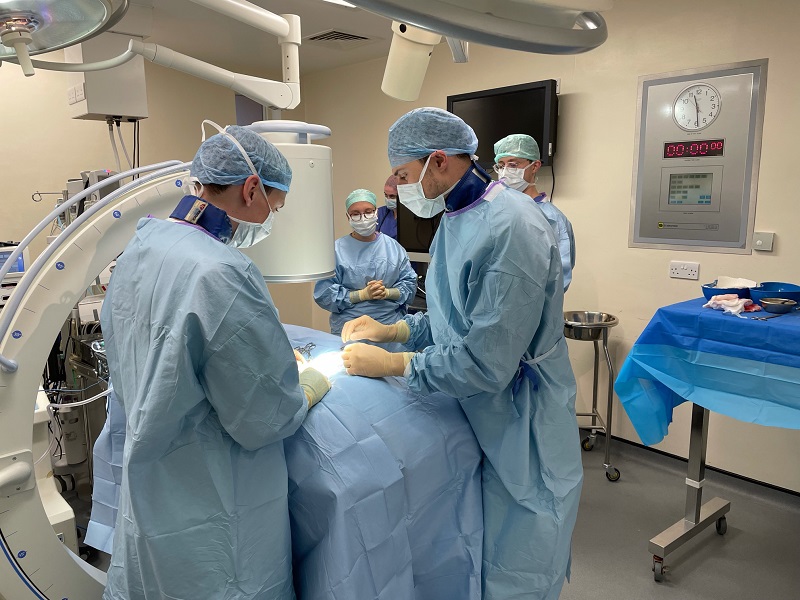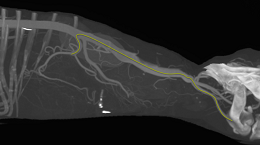Advancing Liver Tumour Treatment
Clinical Connections – Autumn 2021
RVC Small Animal Referrals is now offering transarterial chemoembolisation (TACE) for dogs with non-resectable liver tumours. It is a procedure performed only in a small number of veterinary services in the world.
Surgical resection is considered the gold standard treatment for liver tumours in dogs. However, some tumours are not amenable for surgical excision as they occur in challenging locations and complete excision is associated with increased morbidity or may not be possible. Treatment options for these patients tend to be very limited due to the inherent chemoresistance associated with most of these tumours – especially hepatocellular carcinomas. In these situations, TACE can be considered.
Chemoembolisation is the delivery of an embolic agent combined with chemotherapy to a selected blood vessel to cause slowing or cessation of blood flow to the tumour via vascular occlusion and induce cancer cell death. TACE allows the administration of higher doses of chemotherapy directly to the tumour while decreasing the systemic side effects associated with the more traditional chemotherapy.
The concept of embolisation has been most studied in the liver due to its unique blood supply and the relationship of this blood supply to that of liver tumours – most of the blood supply to a liver tumour is arterial through the hepatic artery, whereas the predominant blood supply to normal liver parenchyma is venous through the portal vein.
TACE is a well-established treatment in human medicine, and randomised clinical trials have shown that it improves the survival and quality of life of patients with liver tumours. Its use in veterinary patients is growing, but only few hospitals offer this treatment in the UK. It represents a novel, innovative treatment for dogs in cases where surgery to remove a liver tumour
is not an option due to its challenging location, or simply when the owners would not consider a surgical approach for their dogs due to their perceived risks associated with surgery or due to the advanced age of their dogs.


The procedure offers a cost-effective and safe alternative treatment for non-resectable hepatic tumours. It can improve the quality of life for patients by shortening duration of hospitalisation, lowering pain levels and also stress levels peri- operatively. It can also improve overall survival of dogs with hepatic tumours.
Soft tissue surgeon Matteo Rossanese, who joined the RVC last year, has successfully performed the procedure elsewhere. He has established TACE at the Queen Mother Hospital for Animals (QMHA), with the assistance of a grant from the Animal Care Trust. The grant allows the team to perform at least four procedures at a reduced cost for the clients.
The procedure involves access with a catheter through an artery on the back leg of the dog. With the use of tiny catheters and wires the main vessel feeding the tumour is selected using fluoroscopy and a combination of chemotherapy and an embolic agent is injected into the vessel to completely occlude it.
Benefits for dogs
Outlining some of the benefits of the development, Matteo Rossanese, Lecturer in Small Animal Surgery, said: “This treatment represents a new innovative option and a great opportunity for our dogs and our clients when surgery is not possible. Dogs would benefit from a minimally invasive procedure, including a quicker recovery, with reduced risks compared to open abdominal surgery."
He also said: "The establishment of TACE at the RVC also offers opportunities for ongoing future clinical research in the area not just of hepatic tumours but also of other tumours where TACE is an established treatment option in human medicine. Therefore, as well as those dogs helped directly through treatment at the RVC, the development can benefit dogs more generally as well as our veterinary colleagues in the wider community.”
